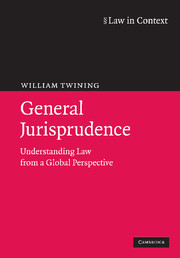Book contents
- Frontmatter
- Contents
- Preface
- Acknowledgements
- List of abbreviations
- Further abbreviations
- Part A
- Part B
- 9 Diffusion of law: A global perspective
- 10 Surface law
- 11 Is law important? Law and the Millennium Development Goals
- 12 The significance of non-state law
- 13 Human rights: Southern voices
- 14 Conclusion
- Bibliography
- Index
11 - Is law important? Law and the Millennium Development Goals
Published online by Cambridge University Press: 05 June 2012
- Frontmatter
- Contents
- Preface
- Acknowledgements
- List of abbreviations
- Further abbreviations
- Part A
- Part B
- 9 Diffusion of law: A global perspective
- 10 Surface law
- 11 Is law important? Law and the Millennium Development Goals
- 12 The significance of non-state law
- 13 Human rights: Southern voices
- 14 Conclusion
- Bibliography
- Index
Summary
It has required great vision, great holiness, great wisdom to keep alive and vivid the sense of unity of man. It is precisely the saints, the poets, the philosophers, and the great men of science who have borne witness to the underlying unity which daily life has denied. But now the distances are abolished. It is at least possible that our new technological resources, properly deployed, will conquer ancient shortage. Can we not at such a time realize the moral unity of our human experience and make it the basis of a patriotism for the world itself?
(Barbara Ward)Introduction
The purpose of this chapter is to give an interpretation of a range of views about the importance of law in economic, social and political development in the context of changing theoretical and technical approaches to ‘development’ from 1945 to the Millennium and a little beyond. Is law important? If so, why and in what respects?
My standpoint is that of an English jurist who has been concerned about economic, social and political development throughout his career, mainly as a theorist, scholar and teacher of law, but also from time to time as a consultant and advisor on a range of specific issues and projects that have been ‘developmentally relevant’. In this regard, I have been more of an observer than a participant.
I am conscious of significant biases in three respects. First, my main experience of, and concerns about, ‘development’ have been rooted in Eastern Africa.
- Type
- Chapter
- Information
- General JurisprudenceUnderstanding Law from a Global Perspective, pp. 323 - 361Publisher: Cambridge University PressPrint publication year: 2009

